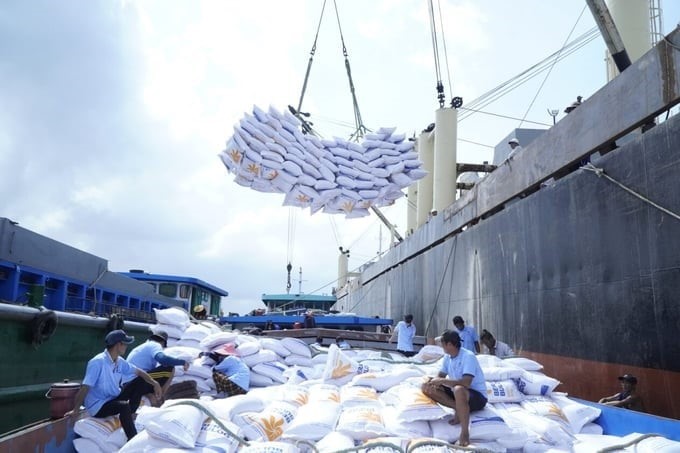November 26, 2025 | 17:58 GMT +7
November 26, 2025 | 17:58 GMT +7
Hotline: 0913.378.918
November 26, 2025 | 17:58 GMT +7
Hotline: 0913.378.918

Vietnamese rice exports to the Indonesian market are likely to experience disadvantages in the coming time. Photo: Loc Troi.
Rice exports in the first 6 months of 2024 grew positively because Vietnam took advantage and improved product quality.
According to a report from the Ministry of Agriculture and Rural Development, Vietnam's total rice export volume in the first 6 months of 2024 reached 4.68 million tons, worth USD 2.98 billion, an increase of 10.4% in volume and 32% in value compared to the same period in 2023.
Customs statistics show that in the first half of 2024, many of Vietnam's top 10 rice export markets recorded strong growth, including Indonesia, which increased by 44%, reaching approximately 709,000 tons.
The Vietnam Trade Office in Indonesia commented that Vietnamese rice exports to the Indonesian market will continue to have favorable conditions when the demand for rice imports that has just been updated by the Indonesian National Food Agency is forecast to increase to 5.18 million tons in 2024 instead of the 3.6 million tons for which the Government of Indonesia has issued import licenses.
However, Vietnamese rice exports to the Indonesian market are also likely to experience disadvantages when Indonesia’s National Logistics Agency (Bulog) and the Indonesian National Food Agency are sued by a civil organization named People's Democracy Study (SDR) to the National Anti-Corruption Commission (KPU).
There are two accusations made by the civil organization SDR. The first is suspicion related to corruption through inflating and adding prices to the price of rice imported from Vietnam.

The Indonesian State's loss from the corruption could reach 2,000 billion rupees (Rp). Photo: LT.
The second is the accusation related to imported rice being backlogged at Tanjung Priok Port (delayed loading and unloading). This results in the cost of late loading and unloading fines, causing the rice price to increase.
According to SDR's calculations, "The State's loss from this corruption could reach 2,000 billion rupees (Rp). This loss is calculated based on the difference in the offer price of a Vietnamese company; the price difference is up to USD 82/ton. If the exchange rate is only 15,000 Rp/USD, the difference is USD 180.4 million. With the amount of imported rice of 2.2 million tons in May 2024, the difference is Rp 2,000 billion."
The price difference that this organization offers is a reference to the offer price of a Vietnamese company named Tan Long Group, which is one of the companies deemed to have participated in the process of supplying imported rice.
In response to SDR's accusations, Bulog denied the accusation: "Vietnam's Tan Long Group was reported to have offered rice prices, but in fact there has not been any official bid quotation since Bulog opened the bid in 2024. This Group does not have any rice import contracts with us this year. Bulog is a victim of this unfounded report, aimed at creating bad publicity."
According to Bulog, Tan Long Group has registered as one of Bulog's partners but has never offered rice prices to Bulog in 2024.
The Vietnam Trade Office in Indonesia said that the case in which the Indonesian National Food Agency and Bulog are sued related to the accusation of corruption from purchasing rice from Vietnam to this country's Anti-Corruption Commission is in the process of investigation. However, it is likely to seriously affect Indonesia's rice purchasing from Vietnam from now until the end of 2024 or until the case is investigated and clarified.
It is completely possible to stop bidding to buy rice from Vietnam so that the Indonesian Anti-Corruption Commission can clarify the case, or Bulog will temporarily avoid buying rice from Vietnam to avoid suspicion of fraud.
The suit is in the process of investigation, verification, and clarification; however, from this unfortunate incident, the Vietnam Trade Office in Indonesia recommends that Vietnamese rice exporting businesses be cautious in any transaction or statement so as not to affect all rice exporting businesses in Vietnam in general.
There needs to be healthy competition among export businesses, solidarity, and mutual protection of the image of rice grain and the country's rice industry.
The unhealthy competition of Vietnamese rice exporting businesses (if any) will create favorable conditions for interest groups in Indonesia to take advantage of, exploit, and ultimately have a major impact on Vietnamese rice exporting businesses.
Translated by Thu Huyen

(VAN) China’s cooking oil is suddenly flooding into India. It all comes down to a soybean surplus that Beijing doesn’t quite know what to do with.

(VAN) An Giang promotes supply-demand connections, standardizes quality and builds value chains, creating a foundation for sustainable bird’s nest development and aiming to expand exports.
/2025/11/24/5339-4-nongnghiep-075331.jpg)
(VAN) Recently, the conference on 'Sustainable Fisheries Linkage Chain - Tilapia for Export' took place in Tien Hai commune, Hung Yen province.
/2025/11/21/4309-2-153400_128.jpg)
(VAN) Green and low-emission rice is paving the way for Vietnamese rice to enter high-end markets, marking the beginning of a transformation journey toward greening and elevating the national rice brand.

(VAN) ‘Right to Win’ outlines a national action plan that shapes a new vision for Viet Nam’s agriculture in an era of renewal and global integration.

(VAN) Lam Dong’s farmed sturgeon output this year is expected to reach 2,300 tons, worth VND 450 billion, affirming the brand’s position on the market.

(VAN) A surge in Ukrainian egg exports, largely driven by soaring sales to the UK over the last few years, has notably pushed up egg prices on the domestic market.